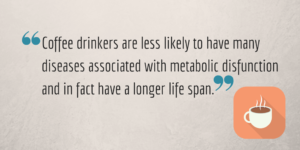
So I’m not sure where the tales of coffee being bad for you or stunting growth really come from, but I can’t find any reason to be concerned. In fact, if you look through all of the information that is available, a very different picture begins to develop(1).
I will start off by saying I have been a huge lover of coffee since high school. This relationship was quite fraught with embarrassment and betrayal due to the common shame imposed on me by my health-minded colleagues. I have worked in the health food industry since I was about 20 and it was always a blight on my reputation if I spoke of coffee fondly. I was easily swept into the prevailing culture as a young kid and believed coffee must truly be an unhealthy food choice.
As I began having more interest in the truly scientific observation regarding our relationship with coffee, I started having a hard time understanding where this cultural anti-coffee and caffeinated beverage movement had actually stemmed from.
The myth that coffee drinking has a detrimental effect on the health of those who regularly consume it has not been shown to be true.
 What the evidence thus far has shown is that coffee is most likely to have a beneficial effect. Coffee drinkers are less likely to have many diseases associated with metabolic disfunction and in fact have a longer life span(2,3). This is interesting as the effect of caffeine is clearly to stimulate the metabolism. It is also the case that coffee is nutritious and contains enough potassium, niacin (b3), and magnesium to beneficially contribute to the diet of those who drink it regularly. While it is clear this is not the only reason it has a positive effect, it is the case that potassium and niacin play an important role in glucose delivery and metabolic efficiency, and magnesium deficiency can contribute to the onset of many metabolic diseases.
What the evidence thus far has shown is that coffee is most likely to have a beneficial effect. Coffee drinkers are less likely to have many diseases associated with metabolic disfunction and in fact have a longer life span(2,3). This is interesting as the effect of caffeine is clearly to stimulate the metabolism. It is also the case that coffee is nutritious and contains enough potassium, niacin (b3), and magnesium to beneficially contribute to the diet of those who drink it regularly. While it is clear this is not the only reason it has a positive effect, it is the case that potassium and niacin play an important role in glucose delivery and metabolic efficiency, and magnesium deficiency can contribute to the onset of many metabolic diseases.
The list of diseases that caffeine, and coffee especially, seems to protect against include:
- Type II diabetes(4)
- Alzheimer’s(5,6)
- Parkinson’s(7)
- Heart Failure(8)
- Cancer(9)
- Thyroid(10) and Liver Health(11) are also improved.
The ability for coffee to promote appropriate blood sugar use(12,13) is a possible reason for the positive effect influencing all of these conditions.
“So wait,” you ask. “How much coffee should I be drinking a day if I want to receive these benefits?”
Well, it might sound crazy but around a quart, 3-5 cups per day, seems to be the optimal intake statistically when measuring the most healthy individuals. Nice, right? It’s like, “Hey have you been remembering to get a cup of coffee with every meal?” Perhaps the saying of our generation will become, “A pot of coffee a day keeps the doctor away.” I mean, I’m sold! I just don’t know how everyone else feels about it…
Also, just so that all you tea and espresso drinkers aren’t left hanging, I will say that while it is less well-studied, both drinks appear to have some if not all of the effects of coffee at similar dosages. Decaf has the magnesium, but the metabolic benefit is much less, and the results with respect to health and longevity are not as apparent.
Is there a downside to drinking coffee?
What I will say about the downside of coffee drinking is that while it is the cliché behavior of coffee drinkers to drink a cup of coffee before breakfast, this is probably not a good idea. While coffee increases our metabolism and improves our blood sugar metabolism, it really only is helpful when consumed by someone who is already well nourished. Drinking coffee on an empty stomach will increase your metabolic rate, but it will also require the stress related hormones to bring “emergency” energy into the system. So, if we are hoping to receive the benefits that coffee presents to our brain and nervous system, it is important we do not compromise the healthful influence by simultaneously increasing the production of the same degenerative hormones we are hoping it will protect us from.
In other words, don’t take the antidote while also increasing the poison it’s there to remove.
Still, there are likely much worse practices in the world being done with the misguided intention of improving health. The use of cream and sugar will be a good start to reducing the potentially harmful effect of drinking coffee on an empty stomach. If you prefer lattes, adding sugar or honey is perhaps even more nourishing.
I suggest having coffee with a large meal or sipping on it directly after. If you are a connoisseur like me, then you want the straight dope. I mean, how can you truly receive the fine notes of toasted sage in a sumatra or dried cranberry in a well developed Kenya with all that milk and sugar getting in the way?
Luckily, an 8-12 oz. coffee at breakfast, lunch, and dinner is my cup of tea—and apparently just what the doctor ordered!
References:
(1)General review of scientific findings
http://www.ncbi.nlm.nih.gov/pubmed/21432699
(2)Recent evidence supports health beneifits
http://www.ncbi.nlm.nih.gov/pubmed/23465359
(3)Long term coffee drinking associated with longevity
http://www.ncbi.nlm.nih.gov/pubmed/24201300
(4)Coffee and tea are associated with reduced Type II diabetes
http://www.ncbi.nlm.nih.gov/pubmed/19727658
(5)Analysis of all available data shows Coffee drinking protects against Alzheimer’s
http://www.ncbi.nlm.nih.gov/pubmed/17427282
(6)Coffee theraputic in induced Alzheimer’s in mice
http://www.ncbi.nlm.nih.gov/pubmed/20182037
(8)Protective against heart failure
http://www.ncbi.nlm.nih.gov/pmc/articles/PMC3425948/
(7)Reduced Parkinson’s with increased coffee intake
http://www.ncbi.nlm.nih.gov/pubmed/20182023
(9)Coffee appears protective against some cancer and increases chances of survival from others
http://www.ncbi.nlm.nih.gov/pubmed/24668519
(10)Coffee may protect against thyroid disease
http://www.ncbi.nlm.nih.gov/pubmed/2816215
(11)Coffee may protect against liver dysfunction
http://www.ncbi.nlm.nih.gov/pubmed/10680318
(12)Coffee and caffiene improve glucose tolerence and insulin sensitivity in mice
http://www.ncbi.nlm.nih.gov/pubmed/22146708
(13)Coffee reduces high-fat diet induced diabetic condition in mice. reduces inflammation in the fat tissue and improves the liver’s use of sugar and reducing the production of fat.
http://www.ncbi.nlm.nih.gov/pubmed/22146708
Other relevant resources:
Chemical Analysis of coffee
Estrogen replacement therapy interrupts coffees protection against Parkinson
http://www.ncbi.nlm.nih.gov/pubmed/15522854
Potential mechanism for its anti-carcinogenic effect








2 Comments